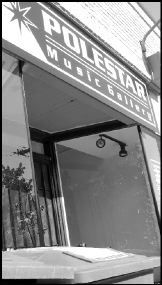POLESTAR MUSIC GALLERY
1412 18th, 329-4224
BECAUSE THE LABELS “classical music” and “popular music” are loaded with baggage, a better way of thinking about the division might be in terms of venue: stand-around-and-drink music vs. sit-down-and-shut-up music. A lot of performers of improvised music come from the stand-around-and-drink world and like the casual atmosphere and hip cachet that club gigs provide. The music those performers make, however, rewards focused, attentive listening, which clubs don’t offer. Traditional sit-down-and-shut-up venues, whether churches or Benaroya Recital Hall, don’t seem quite right, either.
Coffeehouses like Belltown’s Speakeasy, Pioneer Square’s Zeitgeist, or Capitol Hill’s Coffee Messiah have tried to fill the need, and various avant-garde music series have come and gone over the past few years. But since May, the Polestar Music Gallery has offered a near-ideal, full-time alternative. The remodeled storefront shares a nondescript block just off East Union with a capoeira studio and a League of Women Voters office. The space is a 13- by 43-foot whitewashed room: “clean” or “plain” or “stark,” depending on your taste, with a few ferns and a small raised stage backed by a red velvet curtain at one end. It seats about 60 comfortably. Managers Peggy Sartoris-Belaqua and Henry Hughes, after spending a few months repainting, rewiring, and cleaning out the rat droppings, also added a handsome green room—pocket-sized, but a decided improvement over the rest rooms most musicians are accustomed to.
They’ve filled their calendar, all summer and through this fall, with two or three shows a week, featuring local musicians—from Stuart Dempster, Seattle’s patron saint of the didgeridoo, to electronic improv collagists rebreather—as well as others from across America and Europe. This week’s performances alone give a good idea of Polestar’s all-over-the-map programming (literally and figuratively): from Tokyo and Berlin, electronic trio KMH (Wed.); local percussion duo Eveline Mueller-Graf and Bob Rees, with improv quartet CCRK (Fri.); Portland’s Daniel Menche, with Robert Jenkins’ lecture on “Absurdist Cabaret” (Sat.).
The booking philosophy, basically, is to present musicians who don’t have anywhere else to play. Hughes has used “creative music” as a controversial label for what interests him as a presenter: “music that still has some chance in hell to be art rather than product . . . something to be grappled with rather than another commodity.”
“Creating an atmosphere that’s about the music” was the pair’s goal in starting Polestar, says Sartoris-Belaqua, an Evergreen grad and “corporate paper shuffler” who brings a couple decades of experience as a concert producer (lots of punk shows back in the ’80s). But they also wanted to bring to the scene a certain professional polish, a level up from the scruffy informality of a lot of improv performances. Hughes, a longtime new-music devotee, adds, “Over the seven years I’ve been in Seattle, I’ve seen it done well a small percentage of the time and very poorly a much larger percentage of the time. . . . I decided to stop complaining and start doing.”
Hughes realizes that a certain homemade feel is part of the improv scene’s image: “Creative music isn’t just a different kind of music, it involves a different set of social and economic relations; different approaches to making, conceiving, executing, and experiencing art; and a great deal of the time, that does mean—both for good and for ill—that it ain’t gonna look like what happens at Benaroya Hall or a plush club.” For those who come ready to concentrate, to follow a performer’s spontaneous flights of imagination, Polestar’s simplicity works in its favor, both acoustically and psychologically. As Sartoris-Belaqua puts it, “There’s not a whole lot to do here except listen.”








